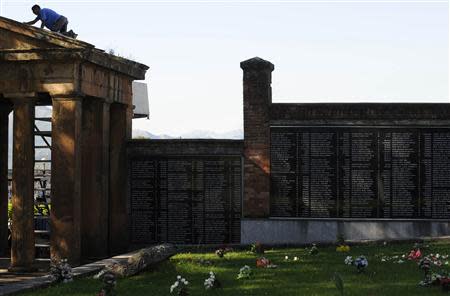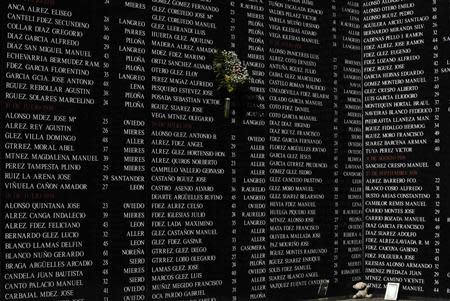Spaniards seek justice in Argentina for Franco-era crimes
By Sonya Dowsett and Emma Pinedo MADRID (Reuters) - Hundreds of Spaniards have turned to an Argentine court to seek justice for crimes committed during the 36-year dictatorship of General Francisco Franco in a case that threatens to dredge up Spain's uncomfortable past. Argentina is turning the tables on Spain by using an international human rights law that Spain itself used in 2005 to prosecute a member of Argentina's former military dictatorship in Spanish courts for crimes against humanity. Lawyers are compiling testimonies to add to Argentine Judge Maria Servini's investigation into possible crimes against humanity one year after Spain's Supreme Court upheld an amnesty for Franco-era officials. Spain, in common with many Latin American countries in their transition to democracy, passed an amnesty law in 1977 which pardoned the crimes of the Franco government. Lawyers are seeking to override this legislation under international law. "We're putting forward many cases including torture, shootings, forced disappearances and stolen babies," Carlos Slepoy, an Argentine lawyer based in Madrid, told Reuters. About 250 people had joined the lawsuit with many more waiting to give testimonials. "People have always wanted an investigation to be carried out here, but that has proved impossible and they have turned to Argentine justice as an alternative." Unlike countries such as Chile or South Africa that formed truth commissions to come to terms with human rights violations in their past, Spain's right and left parties agreed to draw a curtain on history after the death of Franco in 1975 in a 'Pact of Forgetting' which was given a legal basis in the amnesty law. 'TELL ME THE TRUTH' Hundreds of thousands of people died on both sides of Spain's 1936-1939 Civil War. The victors under Franco went on to execute thousands of people after the war was over, according to British historian Paul Preston's book "The Spanish Holocaust". Although some of the cases brought before the Argentine judge deal with torture allegedly carried out by Franco officials in the 1970s, many are seeking justice on behalf of their grandparents. Cristina Serrano, a Madrid-based 52-year-old mother of three, has joined the Argentine lawsuit seeking redress for her grandfather, who was imprisoned and tortured in the 1940s after being denounced by a neighbor for having left-wing views. She has also given evidence about a baby born to her mother in 1956 who apparently died 10 minutes after birth, but that she believes may have been part of alleged mass trafficking by nuns, priests and doctors which started under Franco. "There is a lot of secrecy surrounding the documents. They say they're lost, burnt, everyone tells you something different," she says, telling of her difficulty of piecing together what happened to her sister. "I want them to tell me the truth. There's a side to Spanish history that has not been told. The story has been twisted by those who won." Spanish judge Baltasar Garzon opened an investigation into Franco-era crimes in 2008 but later dropped the politically charged case. "As a country we haven't had the courage to confront our own past," he said at an event in Madrid earlier this year. Garzon played a leading role in the 2005 Spanish trial that sentenced Argentine former navy captain Adolfo Scilingo for throwing political prisoners from aircraft during that country's "Dirty War", the first trial in Spain under laws allowing the prosecution of crimes committed in another country. RETURNING THE FAVOUR Argentina's 1987 amnesty laws, set up to protect perpetrators of crimes committed during its military dictatorship, were overturned by the Argentine Supreme Court months in 2005, just weeks after Scilingo's sentencing. Lawyers hope the Spain case brought in Argentina will trigger an investigation into Franco-era crimes and a similar overturning of Spain's amnesty, which the U.N. human rights office has urged Spain to repeal. "We like to say that we're returning the favor," said Argentinian lawyer Ana Messuti. "Spain started the trials of the Argentine genocides and it drove us to action." In a separate development to the Argentinian investigation, the United Nations has sent a working group to Spain to look into forced disappearances during the dictatorship. The group will present their findings on Monday. "Whether there is the possibility of justice or not, the right to know the truth is fundamental," U.N. working group member Ariel Dulitzky told Reuters. As part of her investigations, Judge Servini earlier this month asked for the arrest and extradition of four former Spanish policemen for torture during the 1960s and 1970s. Spanish authorities said two of the wanted men are dead. High Court Judge Pablo Ruz has asked Argentina to send all the documentation related to the supposed crimes of the police before any extradition order, a legal source said. In Argentina, one lawyer involved with the case said he hoped the arrest warrant would force Spain to investigate the crimes through its own legal system. "We will place more people under formal investigation and we will issue more arrest warrants," said Maximo Castex. Dario Rivas, born in Spain and sent to Argentina aged nine with his brothers, has joined the lawsuit on behalf of his father who stayed in Spain and was shot in the 1930s. "It's a disgrace that the Spanish justice system has not done what we are doing in Argentina. It should be done there, not here," he said. (Additional reporting by Karina Grazina in Buenos Aires; Editing by Fiona Ortiz and Angus MacSwan)


